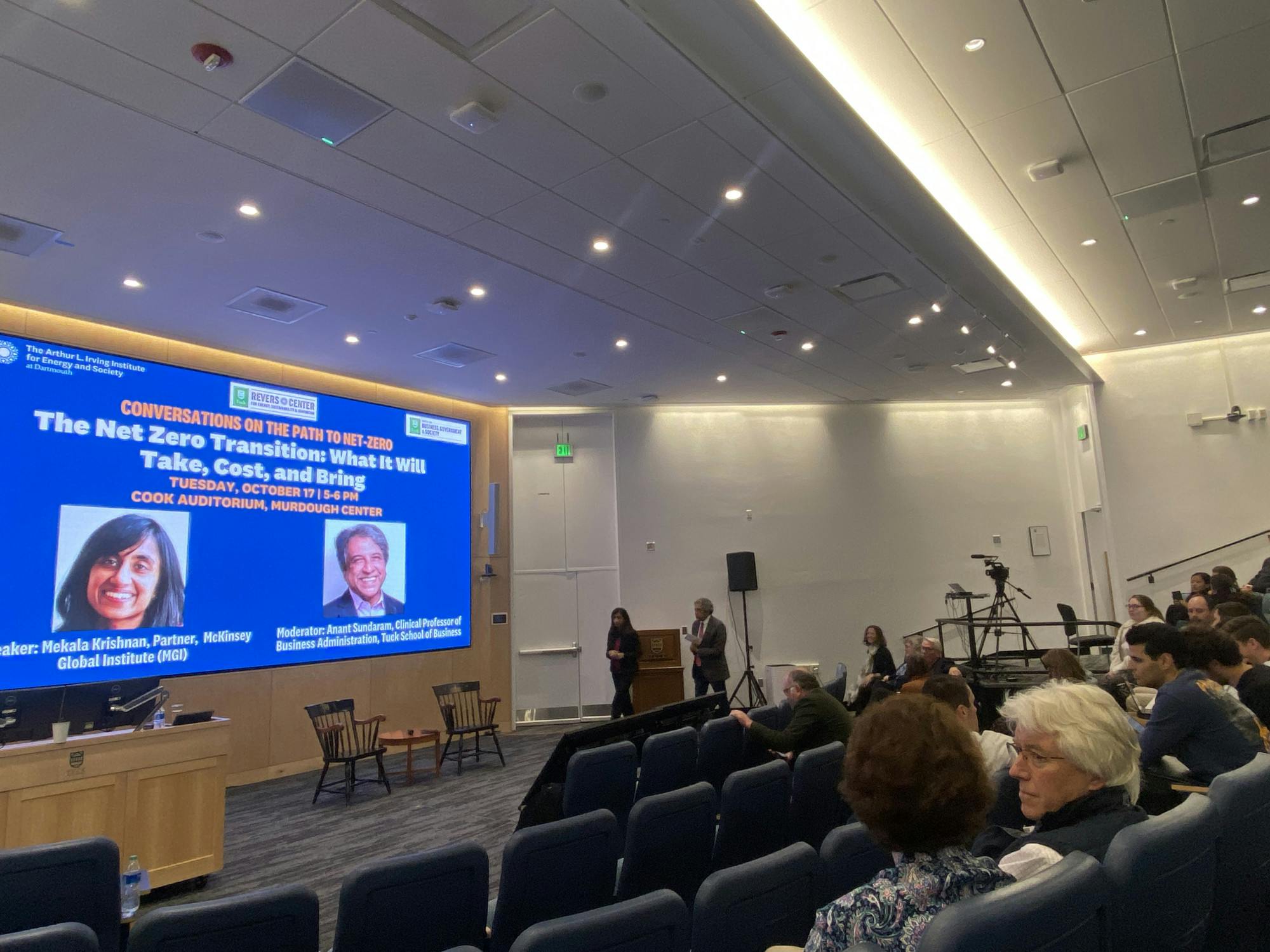On Oct. 17, McKinsey Global Institute partner Mekala Krishnan gave a talk titled “The Net Zero Transition: What It Will Take, Cost and Bring.” During her lecture, Krishnan discussed the world’s responsibilities in transitioning towards net zero emissions by target years 2030 and 2050. Business administration professor at Tuck School of Business Anant Sundaram moderated the event.
Krishnan began by explaining her research on both the physical and economic transformations needed to achieve net zero. Through extensive research in collaboration with scientists at the Woodwell Climate Research Center — a scientific research organization focused on climate change — Krishnan said she has tried to understand how climate hazards such as “flooding and heat” impact various “socioeconomic systems” across the world.
“We have an imperative to act,” Krishnan said.
Reed Cole ’24, an environmental studies and anthropology double major, said Krishnan’s lecture involved an “intersection of science, research, policy and business.” Cole believes discussions on this topic are significant because they go beyond a future that is“just about corporate America.”
“It’s [about] using the theory and what if’s to apply data and strategy,” she said.
According to Krishnan, approximately 250 to 350 million people currently live in areas with a 9% annual probability of lethal heat waves. Without intervention, this number is expected to reach 14% by 2050, she added. Additionally, Krishnan explained that there will be an increased risk of a 15% or higher decline in global grain yield by 2050.
“Food systems, physical assets, natural capital [are] what economic activity relies on,” she said. “Each of these could be at risk if we don’t act to reduce emissions.”
Krishnan also discussed the 1.5 degree Celcius threshold, agreed upon at the 2015 Paris Agreement, which aimed to keep the global temperature from rising more than 1.5 degrees Celsius. According to Krishnan, the world still remains “far away” from achieving those goals, noting the logistical challenges in rebuilding infrastructure and socioeconomic systems that took “200 years to build.”
“One way that people often talk about this is saying that what we need to do in the next 30 years is rebuild the entire energy infrastructure, material systems, supply chains and entire industrialized economy that took 200 years to build,” she said.
Krishnan added that the power system, or “the heart of the energy transition,” also needs to change. Among those changes, Krishnan said power systems would have to update their mobility, transportation, buildings, land use emissions and economic plans.
To achieve net zero by 2050, Krishnan said the world would have to increase its annual climate resource budget to around $9.2 trillion — roughly $3.5 trillion more than it is today.
Krishnan acknowledged that institutions and corporations must work together for net zero emissions to be “feasible.” She added that the transition may not always be “even.”
“Some societies will be more exposed,” she said. “For example, automobile companies, steel manufacturers and chemical producers will be disadvantaged because they may have to reinvent [everything]. Secondary impacts like job opportunities should also be considered. We need to think about the incentives and policies to address these issues.”
The College has committed to rely on 100% renewable energy by 2050 through endeavors such as using reusable food containers at the Class of 1953 Commons and replacing the heating system with a more renewable source of energy. The College has also focused on constructing energy-efficient buildings since the mid-1990s, including the recently-built Irving Institute for Energy and Society, specifically designated to provide spaces for interdisciplinary research on sustainability.
Adamari Benavidez ’25, an anthropology and geography double major, said she was interested to learn about the economic side of the net zero transition and how it “affects people on the ground.”
“I am really thinking about the costs specifically, and how it’s going to be affecting historically marginalized and underrepresented people,” she said.


